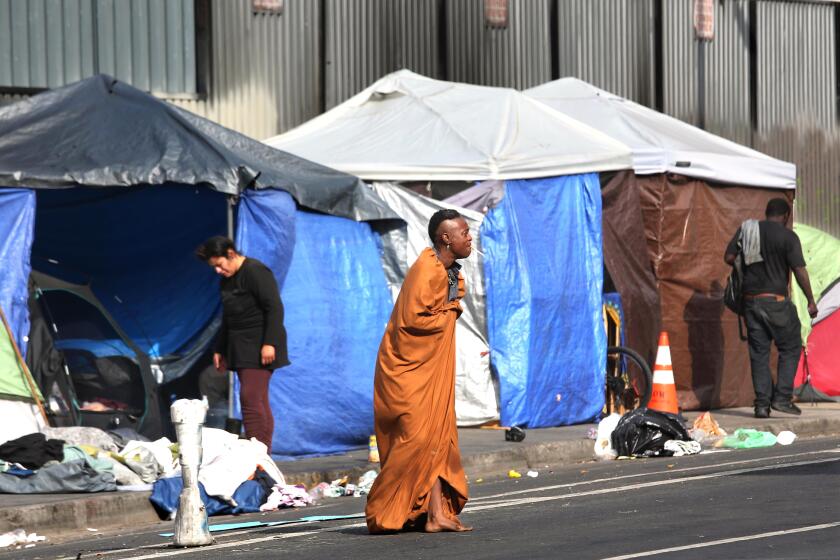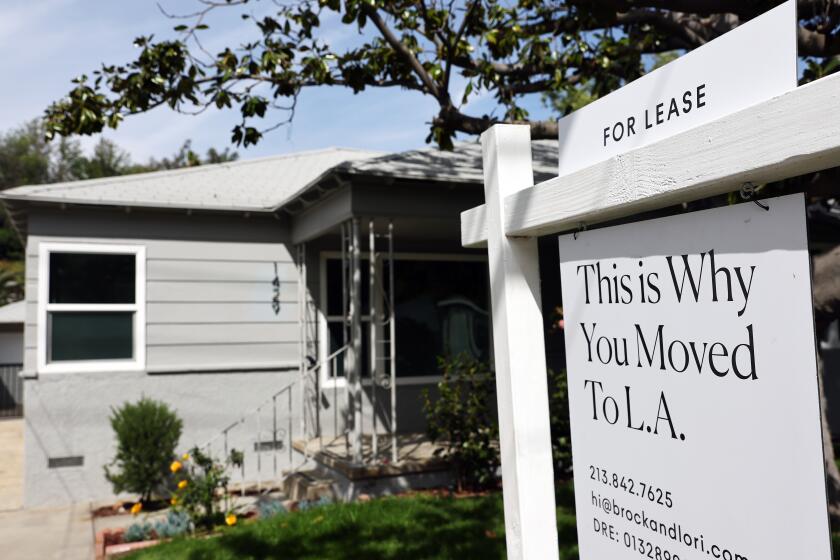Give Me Shelter : L.A.’s Post-WWII Housing Shortage Foreshadowed the Crisis of the 1980s
PERHAPS THE MOST oppressive fact of life in Los Angeles today--even worse than smog and traffic--is the high cost of housing.
It is high, that is, if you can afford it. For many immigrant families, there is no solution but doubling up--two or more families sharing a small house or apartment, at rents that take more than half their income. Others surrender to the slumlords, living in vermin-infested caves with broken-down plumbing, if any. Some live in the streets. Of course, if you have $5 million or $6 million, there’s no problem.
Most of us today don’t remember the housing shortage of 1946, when World War II was over and servicemen began returning home to begin their families. There had been no building during the war; tens of thousands of servicemen had passed through Los Angeles on their way out to the Pacific, and they wanted to make their homes here. There simply weren’t enough houses to go around.
My wife and I were victims of that shortage. After my discharge in February of 1946, I went to work in San Diego, and we rented one of many converted Army shacks. But after three months I quit my job in San Diego and came to Los Angeles to find (1) a job and (2) a place to live. I left my wife in San Diego with our year-old son. Also, she was pregnant.
I found a job but not a house. I commuted for three months. Finally, I rented a tiny one-room house--with bath, kitchenette and screen porch--behind a house in Tujunga. We lived there two years, until the landlady decided she didn’t want growing children in the place.
Virginia Haggarty of Carpinteria has sent me a collection of classified ads she clipped during that postwar housing crunch. They are all under the Wanted to Rent category, and while they reflect the desperation of their authors, they do not seem to reflect the hopelessness that one senses today.
“No sympathy or charity. Wanted: Just a Home. Whatever you have to offer. We aren’t perfect, just normal people. Veteran, wife and child. Won’t you please call us?”
“Have bride but no threshold. Newlywed couple without home. Please rent us a bungalow, apartment or house, furnished or unfurnished. Up to $50.”
“Refined Christian couple. Ex-Army officer & wife. College grads. Want house or apt. Permanently employed. Best local references. No children or pets.”
“It’s the usual tale! But being a returned veteran I do want a home so my wife & I (no children or pets) can be together again. I’m sick of hotels & discouraged no end . . . . Rent to $60.”
One applicant was moved to paraphrase Milton’s “L’Allegro”:
“Hence loathed melancholy
Of Cerebus and blackest midnight born,
In Stygian cave forlorn,
‘mongst horrid shapes and shrieks
and nights unholy
Find out some uncouth cell. . .
Find an apartment for me
And my wife
Poor wife.”
Alas, I don’t know whether this fellow’s approach succeeded or not.
I am curious also about the success of the man who advertised:
“Attention, suckers. Drunken advertising exec. with gambling wife and moronic year-old brat want a modern 2-bedroom house or apt. immediately. Must be in first-class neighborhood. Please call only if your proposition meets with requirements. Mr. Berggren.”
All else having failed, he evidently decided to try the truth.
Help was on the way. All over the suburbs, developers were building hundreds of acres of tract houses to be sold under the GI Bill. They were cracker boxes, but livable.
I finally found one on Mt. Washington. It didn’t look like a tract house, being on a hillside street. It was $8,425. The project superintendent told me to inquire at a real estate office on York Boulevard. I drove to the office. It was Saturday afternoon. I bought ice-cream cones for my wife and children and went in. The house was available. I would have to put $25 down. I wrote a check against insufficient funds.
On Monday I covered the check. We still live in that house.
Sign up for Essential California
The most important California stories and recommendations in your inbox every morning.
You may occasionally receive promotional content from the Los Angeles Times.



